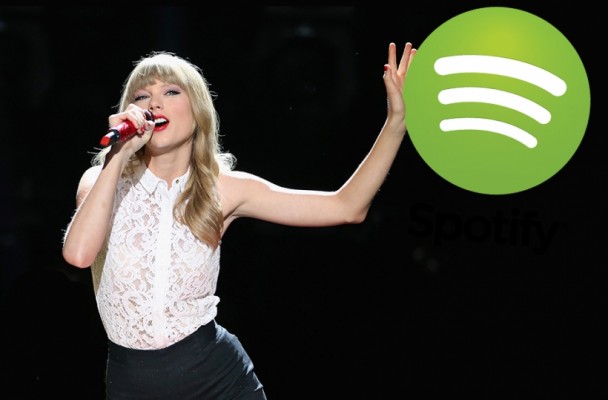Have we lost touch with the real value of music?

Trailblazer Taylor Swift was one of the first major artists to stop her music from streaming on Spotify. Photo by: technobuffalo.com
By Alexis Ancel // News Editor
The music industry has been evolving since the invention of the radio, but in the midst of ever changing names, sounds and genres, the new ways in which we listen to music is altering our perception of the music itself. In recent years, free music streaming services have had a more direct impact on both the artists creating the music we listen to every day and our willingness to pay for it. With iTunes prices at $1.29 per song, streaming services like Spotify and Pandora that offer more in terms of selection and accessibility for free seem like the obvious choice. However, these services have slowly been contributing to the devaluing of music as a whole and musicians are getting gypped in the process.
Spotify, for instance, reportedly pays artists between $0.006 and $0.0084 per stream, but the numbers don’t quite add up. For example, the company claims to have paid Taylor Swift over $2 million for a year’s worth of streaming, yet her label reported receiving a fourth of that compensation at $496,000. Kevin Kadish, co-writer of Meghan Trainor’s “All About That Bass,” earned a total of $5,679 from Spotify for a number one hit in 78 countries and one of the most popular songs of 2014.
It can be hard to look at anyone with a celebrity income and demand that they receive the money they were robbed of, but the problem isn’t that simple. This drastic pay cut is just one side effect of the overall decreasing respect for music perpetuated by the idea that it should be free. Even more progressive services like Apple Music originally did not pay artists for any music streamed during the three-month free trial of Apple Music. That is until Taylor Swift stepped in, of course. In an open letter to Apple discussing her opinions on the matter, Swift wrote, “This is not about me… This is about the new artist or band that has just released their first single and will not be paid for its success. This is about the young songwriter who just got his or her first cut and thought that the royalties from that would get them out of debt. This is about the producer who works tirelessly to innovate and create… but will not get paid for a quarter of a year’s worth of plays on his or her songs.”
Even still, there is something to be said for the exposure that streaming provides. In fact, it may actually be a faster way to advance a musician’s career by increasing concert ticket sales and contributing toward RIAA certification.
Streaming itself does not have to be inherently detrimental to the industry if it’s done right, which Apple demonstrated by changing their policy to fairly compensate artists just 24 hours after Swift’s letter was written.
Other artists are beginning to combat this issue as well. Jay Z is doing so through his own music streaming service called Tidal, which operates so that listeners can support the value of music for a flat monthly fee and still stream and download as much music as they want.
In a time when almost anything is available with the click of a button, the challenge is getting people to respect music enough to choose to pay for it. There is still a lot to be done in this area, but progress is being made.
“When you read these stories of artists getting millions and millions of plays and getting a few hundred dollars, that’s real,” said Scott Borchetta, president of Big Machine Records. “It’s not just the artist, it’s not just the label. It’s the producer and it’s the musicians and everybody involved in the creative community, and so that’s why we have got to continue this conversation as loudly as possible.”